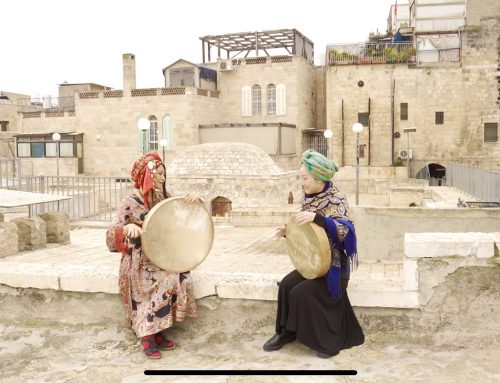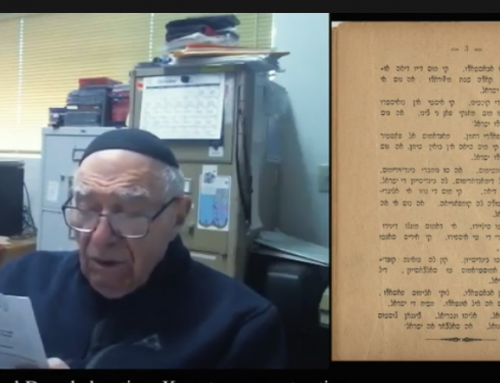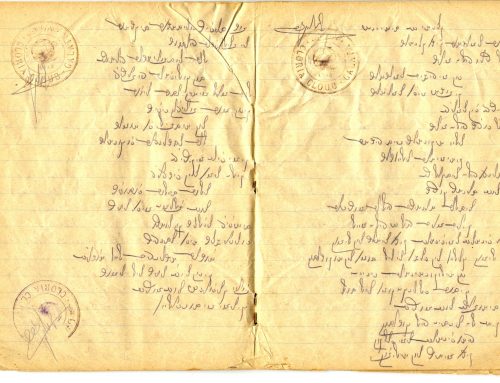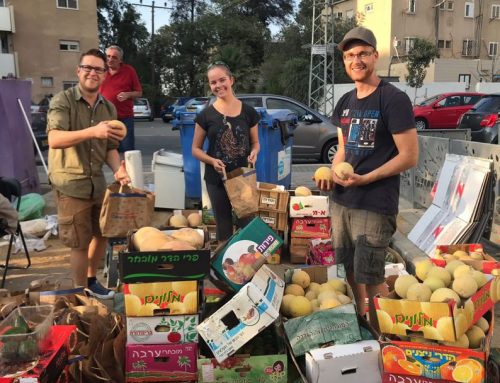By Denise Grollmus
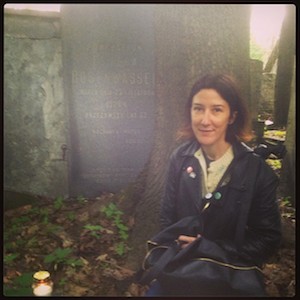
The author pictured in May 2013 next to the grave of her great-great-grandmother, Estera Rosenwasser, in the Warsaw Jewish Cemetery.
My interest in Jewish Studies began on October 3, 2008. It was my 28th birthday. It was also the day I discovered that I was Jewish.
On that day, my maternal grandmother finally revealed the truth about her identity—one she’d kept concealed since she first went into hiding in Warsaw, Poland in 1939. She wasn’t a Catholic Pole, but a Polish Jew. We were not descended from Rybinskas and Lipinskas, but Rosenwassers and Sternstraits. We were, in fact, Jewish.
Since then, I’ve been consumed by what that means. In 2009, I took my first trip to Poland with the hope of better understanding my family’s history. Amidst record searches, trips to museums and Holocaust memorials, and testimony from those who knew my grandmother during the war, I happened upon another incredible discovery: a whole community of people just like me.
While my story is unusual in the United States, it is absolutely the norm for Polish Jews today. After 90 percent of Poland’s Jewish community was murdered during WWII and then tens of thousands more were exiled in the Communist purge of 1968, people believed that there were no Jews left in Poland. It wasn’t until the fall of the Iron Curtain that Polish Jews began to emerge from the Jewish closet and reclaim the heritage from which they were so traumatically severed.
Today, there are anywhere from 5,000 to 20,000 self-described Jews living and practicing in Poland. In Warsaw alone, there are now three congregations and a vibrant JCC among many more Jewish organizations. Non-Jewish Poles are also embracing their country’s Jewish story as a vital part of their own history—the missing piece in the puzzle of Polish identity, a story that remained taboo until a decade ago.
It was the discovery of my Jewish roots that led me back to academic life after working as a journalist for almost a decade. In 2012, I received my MFA in Creative Writing from Penn State University, where I wrote the manuscript of my memoir, The Value of Ruins, which narrates my family’s patterns of traumatic inheritance since the war. That same year, I also returned to Poland as a Fulbright Scholar in order to research and write about the country’s revival of Jewish life.
While reporting on my various discoveries for Tablet Magazine and developing a podcast for The Guardian UK’s “Sounds Jewish” series, a question began to haunt my research: what would it look like if three million Jews returned to Poland, making it the center of the Jewish diaspora once again? It’s the same question that motivates Yael Bartana’s And Europe Will Be Stunned, a film trilogy with which I became fascinated during my time in Poland.
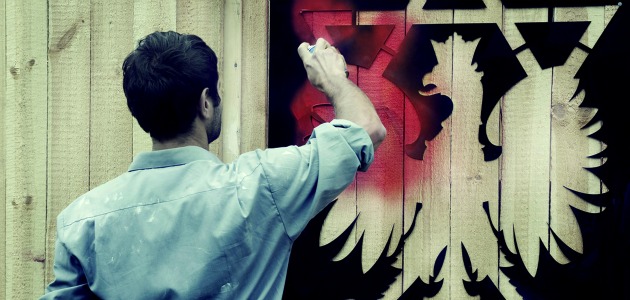
Still from Yael Bartana’s film “And Europe Will Be Stunned,” 2011
In 2011, Bartana, an Israeli video artist, became the first non-Pole to represent Poland at the Venice Biennale, where she presented And Europe Will Be Stunned for the first time.
The first of the three films, Mary Koszmary (“Nightmares”), features Sławomir Sierakowski, the leader of Poland’s left-wing intellectual movement and publication of the same name, Krytyka Polityczna (“Political Critique”).
In the film, Sierakowski plays the role of a Polish politician in the Communist mold, outfitted in a vintage leather jacket and thick, black-rimmed glasses. He stands inside the weed-riddled ruins of the former National Stadium, a highly politicized location from where, in 1968, the Polish Prime Minister, Władysław Gomułka, infamously exiled Poland’s remaining Jewish population. He denounced Poland’s Jewry as a total enemy of the State whose Zionist allegiances threatened the well-being of Poland’s Communist government (one that, ironically, Polish Jews were frequently accused of forcing upon Poles as part of the “żydokomuna” [“Judeo-Communist”] conspiracy still referenced in Polish society today).
Though tinged with aesthetics that echo this moment of institutional anti-Semitism, the speech delivered by Sierakowski performs the opposite role of Gomułka’s. Rather than dismiss the Jews, Sierakowski invites three million back to Poland, begging, “Come back! We need you!” Here is a clip of this pivotal moment from Mary Koszmary:
In the following two films, Bartana shows us what such a return to Poland might look like. Of course, Bartana isn’t the first to depict such a counter-Zionist movement: And Europe Will Be Stunned extends the ironic representation of counter-Zionism offered two decades earlier by Philip Roth in his 1993 novel Operation Shylock: A Confession. By returning Jewish nationalism to its site of origin, Roth and Bartana’s decontextualized representations examine the problematic qualities of nationalism in general, at the same time that they express the anxiety of existing without a Jewish one.
Thanks to the generous support of the Jewish Studies Graduate Fellowship, I will spend my first year as a PhD candidate in English at the University of Washington developing a comparative examination of Bartana and Roth. My goal is to discuss why and how Jewish nationalism exists, as well as how Jewishness, as defined by Judith Butler’s readings of Jewish thinkers such as Hannah Arendt and Walter Benjamin, can offer alternatives to Jews and non-Jews alike.


